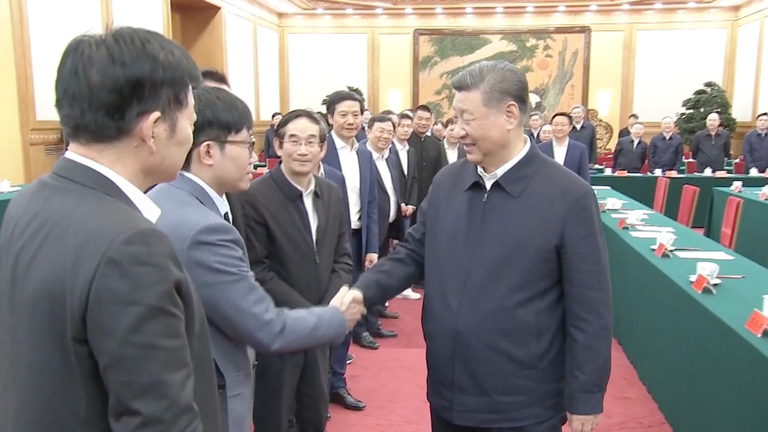Congress Advocates for GPS Tracking on All Exported Semiconductors
Congress Proposes GPS Tracking for Exported Semiconductors
In response to ongoing concerns about securing semiconductor technology from China, Congress has introduced a dramatic new proposal. Lawmakers are advocating for mandatory GPS-like tracking to be embedded in every AI chip exported from the United States. This initiative transforms advanced semiconductors into devices that provide location data back to the U.S. government.
On May 15, 2025, a bipartisan coalition of eight House representatives unveiled the Chip Security Act. This legislation requires companies such as Nvidia to integrate location verification mechanisms into their processors before exporting them. This marks one of the most intrusive measures in America’s tech competition with China, shifting from merely prohibiting where chips can travel to actively monitoring their destinations.
The Mechanism of AI Chip Surveillance
The proposed Chip Security Act would mandate surveillance for all designated integrated circuit products, specifically those classified under various Export Control Classification Numbers. Firms like Nvidia would have to embed these tracking mechanisms before any export, re-export, or domestic transfer to foreign nations.
Representative Bill Huizenga, a Republican from Michigan and co-sponsor of the bill, emphasized the need for safeguards to prevent circumvention of export controls that could allow advanced AI chips to reach undesirable recipients. Co-lead and Illinois Democrat, Representative Bill Foster, underscored the capability to utilize technology to prevent powerful AI from falling into the wrong hands.
This legislation extends well beyond mere tracking. Companies would be required to maintain ongoing reporting obligations regarding any credible instances of chip diversion, including changes in location, unauthorized users, or attempts at tampering. This establishes a continuous monitoring process that persists beyond the point of sale, fundamentally changing the relationship between manufacturers and their products.
Broad Support for Technology Control
Notably, this AI chip surveillance initiative has garnered bipartisan support. The bill is co-led by Chairman of the House Select Committee on China, John Moolenaar, and Ranking Member Raja Krishnamoorthi, along with other significant co-sponsors. Moolenaar remarked that the Chinese Communist Party has taken advantage of vulnerabilities in the U.S. export control system.
The overlap in perspectives regarding AI chip surveillance demonstrates how ingrained the issue of China has become within American political discourse, cutting across traditional party lines. The Senate has also introduced similar measures through Senator Tom Cotton, indicating widespread congressional backing for semiconductor surveillance. This cross-chamber coordination shows a likelihood that some form of AI chip surveillance may soon become law, independent of which party holds congressional power.
Technical Challenges and Implementation Concerns
Questions surrounding the technical implementation of AI chip surveillance highlight challenges related to feasibility, security, and performance. The bill requires chips to utilize location verification techniques deemed suitable within 180 days of becoming law but lacks detailed descriptions of how to achieve this without hampering chip performance or introducing vulnerabilities.
For industry leaders like Nvidia, incorporating mandatory surveillance features could significantly impact product design and manufacturing processes. Each chip would require integrated functions for location verification, potentially leading to additional components, higher power usage, and processing overhead—issues that could detrimentally affect performance, particularly in AI applications where efficiency is crucial.
The bill also empowers the Secretary of Commerce with extensive enforcement authority to “verify, in a manner the Secretary deems appropriate, the ownership and location” of exported semiconductor chips. This could establish a real-time monitoring system where the U.S. government may potentially track every advanced semiconductor globally, leading to concerns about data sovereignty and personal privacy.
The proposal for AI chip surveillance signifies a novel intersection between national security needs and commercial technology products. Unlike conventional export controls which merely restrict destinations, this new approach necessitates ongoing monitoring, blurring the boundaries between private business and state surveillance.
Representative Foster’s expertise as a physicist adds technical credibility to this initiative. It underscores the way scientific knowledge can be leveraged in geopolitical rivalries. The legislation suggests a belief that technical means can address political challenges, positing that integrating surveillance capabilities into semiconductors can mitigate misuse.
Nevertheless, this proposed law poses essential questions regarding technology exports in a globalized landscape. Should every advanced semiconductor be treated as a potential surveillance instrument? How will compulsory AI chip monitoring impact innovation in countries dependent on U.S. technology? And what precedent might this set for other nations aiming to oversee their technological exports?
The enactment of mandatory AI chip surveillance could unintentionally fast-track the evolution of alternative semiconductor supply chains. If U.S. chips come with integrated tracking systems, other countries might double down on their initiatives to develop domestic alternatives or engage with suppliers that lack such requirements. China, which is already making significant investments in semiconductor self-sufficiency in response to U.S. restrictions, may interpret these surveillance guidelines as further motivation for technological decoupling. There’s a striking irony in how efforts to monitor the usage of U.S. chips in China could ultimately diminish their attractiveness and market presence worldwide.
Meanwhile, allied nations may reconsider their reliance on chips that are subject to U.S. governmental oversight for critical infrastructure. The broad language of this legislation implies that AI chip surveillance would extend to all foreign nations, not just adversaries, potentially straining ties with partners who cherish their technological sovereignty.
As the Trump administration seeks to establish a successor to Biden’s AI Diffusion Rule, Congress appears eager to take action. The Chip Security Act signifies a more proactive strategy than traditional export controls, shifting the focus from mere restrictions to active monitoring, which could fundamentally alter the global semiconductor landscape.
This transformation reflects more profound shifts in how countries understand technology exports amid a climate of great power competition. The semiconductor sector, once primarily driven by market forces and technical standards, is increasingly influenced by geopolitical considerations that emphasize control over commerce.
Whether AI chip surveillance transforms into law now hinges on congressional actions and industry reactions. However, with bipartisan support evident, some level of semiconductor monitoring appears likely, heralding a new chapter in the interconnectedness of technology, commerce, and national security.
Conclusion: Are Anonymous Semiconductors from America Coming to an End?
The critical issue facing the semiconductor industry is not whether the U.S. will regulate technology exports, but rather the extent to which it will surveil them once they cross U.S. borders. In this emerging framework, every chip might become a potential intelligence asset, with every export translated into a data point for a global surveillance network.
The semiconductor industry now confronts a pivotal decision: adapt to a reality where products include their own tracking mechanisms, or risk exclusion from the U.S. market entirely. As Congress advocates for mandatory AI chip surveillance, we could be witnessing the end of anonymous semiconductors and the dawn of an era where each processor knows its destination and relays that information back as necessary.
Explore more: Navigate the evolving landscape of technology and regulation at prominent industry events like the AI & Big Data Expo held in Amsterdam, California, and London, where you can engage with leading minds in AI and big data.
Reddit sues Anthropic over AI data scraping
The modern ROI imperative: AI deployment, security and governance
AI enables a shift from enablement to strategic leadership
Tackling hallucinations: MIT spinout is teaching AI to acknowledge when it is unsure
Join our Community
Subscribe now to receive all our premium content and latest tech news directly in your inbox.
Artificial Intelligence in Various Sectors
Machine learning plays a crucial role in improving the security of cloud-native containers. In addition to this, innovative applications of machine learning are transforming business operations across various industries.
Innovative Applications in Business
Recent developments showcase how machine learning can enhance various business applications, making processes more efficient and effective.
AI in Music Streaming
Concerns have arisen over the use of AI and bots in manipulating music streaming numbers, raising ethical questions within the industry.
Outsourcing Development
Partnering with outsourced developers presents organizations with numerous benefits, bringing in specialized skills and efficiency to project completion.
Recent Innovations in AI
On June 3, 2025, an MIT spinoff has developed a method to enable AI systems to recognize their limitations and admit when they lack knowledge. This approach is significant for improving the reliability of AI applications.
Furthermore, IBM and Roche are collaborating on a project that employs AI to predict blood sugar levels, ultimately improving diabetes management strategies.
Debates on Free Speech
However, the latest AI model from DeepSeek has sparked criticism, with advocates claiming it represents a regression for free speech rights.
Stay updated with our premium content and the latest in technology by subscribing to our newsletter.







